 полная версия
полная версияMemoirs of Napoleon Bonaparte — Volume 10
Napoleon returned to Paris about the end of July after an absence of ten months, the longest he had yet made since he had been at the head of the French Government, whether as Consul or Emperor. The interview at Tilsit, the Emperor Alexander's friendship, which was spoken of everywhere in terms of exaggeration, and the peace established on the Continent, conferred on Napoleon a moral influence in public opinion which he had not possessed since his coronation. Constant in his hatred of deliberative assemblies, which he had often termed collections of babblers, ideologists, and phrasemongers, Napoleon, on his return to Paris, suppressed the Tribunate, which had been an annoyance to him ever since the first day of his elevation. The Emperor, who was 'skillful above all men in speculating on the favourable disposition of opinion, availed himself at this conjuncture of the enthusiasm produced by his interview on the Niemen. He therefore discarded from the fundamental institutions of the government that which still retained the shadow of a popular character. But it was necessary that he should possess a Senate merely to vote men; a mute Legislative Body to vote money; that there should be no opposition in the one and no criticism in the other; no control over him of any description; the power of arbitrarily doing whatever he pleased; an enslaved press;—this was what Napoleon wished, and this be obtained. But the month of March 1814 resolved the question of absolute power!
In the midst of these great affairs, and while Napoleon was dreaming of universal monarchy, I beheld in a less extensive sphere the inevitable consequences of the ambition of a single man. Pillage and robbery were carried on in all parts over which my diplomatic jurisdiction extended. Rapine seemed to be legally authorised, and was perpetrated with such fury, and at the same time with such ignorance, that the agents were frequently unacquainted with the value of the articles which they seized. Thus, for example, the Emperor ordered the seizure at Hamburg, Bremen, and Lubeck of all English merchandise, whatever might be its nature or origin. The Prince of Neufchatel (Berthier) wrote to me from the Emperor that I must procure 10,000,000 francs from the Hanse Towns. M. Daru, the Intendant-General, whose business it was to collect this sort of levy, which Napoleon had learned to make in Egypt, wrote to urge me to obtain a prompt and favourable decision. The unfortunate towns which I was thus enjoined to oppress had already suffered sufficiently. I had obtained, by means of negotiation, more than was demanded for the ransom of the English merchandise, which had been seized according to order. Before I received the letters of M. Darn and the Prince of Neufchatel I had obtained from Hamburg 16,000,000 instead of 10,000,000, besides nearly 3,000,000 from Bremen and Lubeck. Thus I furnished the Government with 9,000,000 more than had been required, and yet I had so managed that those enormous sacrifices were not overoppressive to those who made them. I fixed the value of the English merchandise because I knew that the high price at which it sold on the Continent would not only cover the proposed ransom but also leave a considerable profit. Such was the singular effect of the Continental system that when merchandise was confiscated, and when afterwards the permission to sell it freely was given, the price fetched at the sale was so large that the loss was covered, and even great advantage gained.
Peace being concluded with Russia it was necessary to make choice of an Ambassador, not only to maintain the new relations of amity between Napoleon and Alexander, but likewise to urge on the promised intervention of Russia with England,—to bring about reconciliation and peace between the Cabinets of Paris and London. The Emperor confided this mission to Caulaincourt, with respect to whom there existed an unfounded prejudice relating to some circumstances which preceded the death of the Duc d'Enghien. This unfortunate and unjust impression had preceded Caulaincourt to St. Petersburg, and it was feared that he would not experience the reception due to the French Ambassador and to his own personal qualities. I knew at the time, from positive information, that after a short explanation with Alexander that monarch retained no suspicion unfavourable to our Ambassador, for whom he conceived and maintained great esteem and friendship.
Caulaincourt's mission was not, in all respects, easy of fulfilment, for the invincible repugnance and reiterated refusal of England to enter into negotiations with France through the medium of Russia was one of the remarkable circumstances of the period of which I am speaking. I knew positively that England was determined never to allow Napoleon to possess himself of the whole of the Continent,—a project which he indicated too undisguisedly to admit of any doubt respecting it. For two years he had indeed advanced with rapid strides; but England was not discouraged. She was too well aware of the irritation of the sovereigns and the discontent of the people not be certain that when she desired it, her lever of gold would again raise up and arm the Continent against the encroaching power of Napoleon. He, on his part, perceiving that all his attempts were fruitless, and that England would listen to no proposals, devised fresh plans for raising up new enemies against England.
It probably is not forgotten that in 1801 France compelled Portugal to make common cause with her against England. In 1807 the Emperor did again what the First Consul had done. By an inexplicable fatality Junot obtained the command of the troops which were marching against Portugal. I say against Portugal, for that was the fact, though France represented herself as a protector to deliver Portugal from the influence of England. Be that as it may, the choice which the Emperor made of a commander astonished everybody. Was Junot, a compound of vanity and mediocrity, the fit man to be entrusted with the command of an army in a distant country, and under circumstances in which great political and military talents were requisite? For my own part, knowing Junot's incapacity, I must acknowledge that his appointment astonished me. I remember one day, when I was speaking on the subject to Bernadotte, he showed me a letter he had received from Paris, in which it was said that the Emperor had sent Junot to Portugal only for the sake of depriving him of the government of Paris. Junot annoyed Napoleon by his bad conduct, his folly, and his incredible extravagance. He was alike devoid of dignity- either in feeling or conduct. Thus Portugal was twice the place of exile selected by Consular and Imperial caprice: first, when the First Consul wished to get rid of the familiarity of Lannes; and next, when the Emperor grew weary of the misconduct of a favourite.
The invasion of Portugal presented no difficulty. It was an armed promenade and not a war; but how many events were connected with the occupation of that country! The Prince Regent of Portugal, unwilling to act dishonourably to England, to which he was allied by treaties; and unable to oppose the whole power of Napoleon, embarked for Brazil, declaring that all defence was useless. At the same time he recommended his subjects to receive the French troops in a friendly manner, and said that he consigned to Providence the consequences of an invasion which was without a motive. He was answered in the Emperor's name that, Portugal being the ally of England, we were only carrying on hostilities against, the latter country by invading his dominions.
It was in the month of November that the code of French jurisprudence, upon which the most learned legislators had indefatigably laboured, was established as the law of the State, under the title of the Code Napoleon. Doubtless this legislative monument will redound to Napoleon's honour in history; but was it to be supposed that the same laws would be equally applicable throughout so vast an extent as that comprised within the French Empire? Impossible as this was, as soon as the Code Napoleon way promulgated I received orders to establish it in the Hanse Towns.
—[This great code of Civil Law was drawn up under Napoleon's orders and personal superintendence. Much had been prepared under the Convention, and the chief merits of it were due to the labours of such men as Tronchet; Partatis, Bigot de Preameneu, Maleville, Cambaceres, etc. But it was debated under and by Napoleon, who took a lively interest in it. It was first called the "Code Civil," but is 1807 was named "Code Napoleon," or eventually "Les Cinq Codes de Napoleon." When completed in 1810 it included five Codes—the Code Civil, decreed March 1803; Code de Procedure Civile, decreed April 1806; Code de Commerce, decreed September 1807; Code d'Instruction Criminelle, decreed November 1808; and the Code Penal, decreed February 1810. It had to be retained by the Bourbons, and its principles have worked and are slowly working their way into the law of every nation. Napoleon was justly proud of this work. The Introduction of the Code into the conquered countries was, as Bourrienne says, made too quickly. Puymaigre, who was employed in the administration of Hamburg after Bourrienne left, says, "I shall always remember the astonishment of the Hamburgers when they were invaded by this cloud of French officials, who, under every form, made researches is their houses, and who came to apply the multiplied demands of the fiscal system. Like Proteus, the administration could take any shape. To only speak of my department, which certainly was not the least odious one, for it was opposed to the habits of the Hamburgers and annoyed all the industries, no idea can be formed of the despair of the inhabitants, subjected to perpetual visits, and exposed to be charged with contraventions of the law, of which they knew nothing.
"Remembering their former laws, they used to offer to meet a charge of fraud by the proof of their oath, and could not imagine that such a guarantee could be repulsed. When they were independent they paid almost nothing, and such was the national spirit, that in urgent cases when money was wanted the senate taxed every citizen s certain proportion of his income, the tenth or twentieth. A donator presided over the recovery of this tax, which was done in a very strange manner. A box, covered with a carpet, received the offering of every citizen, without any person verifying the sum, and only on the simple moral guarantee of the honesty of the debtor, who himself judged the sum he ought to pay. When the receipt was finished the senate always obtained more than it had calculated on." (Puymaigre, pp, 181.)]—
The long and frequent conversations I had on this subject with the Senators and the most able lawyers of the country soon convinced me of the immense difficulty I should have to encounter, and the danger of suddenly altering habits and customs which had been firmly established by time.
The jury system gave tolerable satisfaction; but the severe punishments assigned to certain offences by the Code were disapproved of. Hence resulted the frequent and serious abuse of men being acquitted whose guilt was evident to the jury, who pronounced them not guilty rather than condemn them to a punishment which was thought too severe. Besides, their leniency had another ground, which was, that the people being ignorant of the new law were not aware of the penalties attached to particular offences. I remember that a man who was accused of stealing a cloak at Hamburg justified himself on the ground that he committed the offence in a fit of intoxication. M. Von Einingen, one of the jury, insisted that the prisoner was not guilty, because, as he said, the Syndic Doormann, when dining with him one day, having drunk more wine than usual, took away his cloak. This defence per Baccho was completely successful. An argument founded on the similarity between the conduct of the Syndic and the accused, could not but triumph, otherwise the little debauch of the former would have been condemned in the person of the latter. This trial, which terminated so whimsically, nevertheless proves that the best and the gravest institutions may become objects of ridicule when suddenly introduced into a country whose habits are not prepared to receive them.
The Romans very wisely reserved in the Capitol a place for the gods of the nations they conquered. They wished to annex provinces and kingdoms to their empire. Napoleon, on the contrary, wished to make his empire encroach upon other states, and to realise the impossible Utopia of ten different nations, all having different customs and languages, united into a single State. Could justice, that safeguard of human rights, be duly administered in the Hanse Towns when those towns were converted into French departments? In these new departments many judges had been appointed who did not understand a word of German, and who had no knowledge of law. The presidents of the tribunals of Lilbeck, Stade, Bremerlehe, and Minden were so utterly ignorant of the German language that it was necessary to explain to them all the pleadings in the council-chamber. Was it not absurd to establish such a judicial system, and above all, to appoint such men in a country so important to France as Hamburg and the Hanse Towns? Add to this the impertinence of some favourites who were sent from Paris to serve official and legal apprenticeships in the conquered provinces, and it may be easily conceived what was the attachment of the people to Napoleon the Great.
CHAPTER XIII
1807-1808.
Disturbed state of Spain—Godoy, Prince of the Peace—Reciprocal accusations between the King of Spain and his son—False promise of Napoleon—Dissatisfaction occasioned by the presence of the French troops—Abdication of Charles IV.—The Prince of the Peace made prisoner—Murat at Madrid—Important news transmitted by a commercial letter—Murat's ambition—His protection of Godoy— Charles IV, denies his voluntary abdication—The crown of Spain destined for Joseph—General disapprobation of Napoleon's conduct— The Bourbon cause apparently lost—Louis XVIII. after his departure from France—As Comte de Provence at Coblentz—He seeks refuge in Turin and Verona—Death of Louis XVII—Louis XVIII. refused an asylum in Austria, Saxony, and Prussia—His residence at Mittan and Warsaw—Alexander and Louis XVIII—The King's departure from Milan and arrival at Yarmouth—Determination of the King of England—M. Lemercier's prophecy to Bonaparte—Fouche's inquiries respecting Comte de Rechteren—Note from Josephine—New demands on the Hanse Towns—Order to raise 3000 sailors in Hamburg.
The disorders of Spain, which commenced about the close of the year 1807, in a short time assumed a most complicated aspect. Though far from the theatre of events I obtained an intimate knowledge of all the important facts connected with the extraordinary transactions in the Peninsula. However, as this point of history is one of the most generally, though I cannot say the best, known, I shall omit in my notes and memoranda many things which would be but repetitions to the reading portion of the public. It is a remarkable fact that Bonaparte, who by turns cast his eyes on all the States of Europe, never directed his attention to Spain as long as his greatness was confined to mere projects. Whenever he spoke of his future destiny he alluded to Italy, Germany, the East, and the destruction of the English power; but never to Spain. Consequently, when he heard of the first symptoms of disorder in the Peninsula he paid but little attention to the business, and some time elapsed before he took any part in events which subsequently had so great an influence on his fate.
Godoy reigned in Spain under the name of the imbecile Charles IV. He was an object of execration to all who were not his creatures; and even those whose fate depended upon him viewed him with the most profound contempt. The hatred of a people is almost always the just reward of favourites. What sentiments, therefore, must have been inspired by a man who, to the knowledge of all Spain, owed the favour of the king only to the favours of the queen!
—[Manuel Godoy, originally a private in the guards, became the paramour of Charles IV.'s Queen; then a grandee; and then the supreme ruler of the State.—Editor of 1836 edition.]—
Godoy's ascendancy over the royal family was boundless; his power was absolute: the treasures, of America were at his command, and he made the most infamous use of them. In short, he had made the Court of Madrid one of those places to which the indignant muse of Juvenal conducts the mother of Britanicus. There is no doubt that Godoy was one of the principal causes of all the misfortunes which have overwhelmed Spain under so many various forms.
The hatred of the Spaniards against the Prince of the Peace was general. This hatred was shared by the Prince the Asturias,—[Afterwards Ferdinand VII.]— who openly declared himself the enemy of Godoy. The latter allied himself with France, from which he hoped to obtain powerful protection against his enemies. This alliance gave rise to great dissatisfaction in Spain, and caused France to be regarded with an unfavourable eye. The Prince of the Asturias was encouraged and supported by the complaints of the Spaniards, who wished to see the overthrow of Godoy's power. Charles IV., on his part, regarded all opposition to the Prince of the Peace as directed against himself, and in November 1807 he accused his son of wishing to dethrone him.
The King of Spain did not confine himself to verbal complaints. He, or rather the Prince of the Peace, acting in his name, arrested the warmest partisans of the Prince of the Asturias. The latter, understanding the sentiments of his father, wrote to Napoleon, soliciting his support. Thus the father and son, at open war, were appealing one against another for the support of him who wished only to get rid of them both, and to put one of his brothers in their place, that he might have one junior more in the college of European kings: but, as I have already mentioned, this new ambition was not premeditated; and if he gave the throne of Spain to his brother Joseph it was only on the refusal of his brother Louis (King of Holland) to accept it.
The Emperor had promised to support Charles IV against his son; and, not wishing to take part in these family quarrels, he had not answered the first letters of the Prince of the Asturias. But finding that the intrigues of Madrid were taking a serious turn, he commenced provisionally by sending troops to Spain. This gave offence to the people, who were averse to the interference of France. In the provinces through which the French troops passed it was asked what was the object: of the invasion. Some attributed it to the Prince of the Peace, others to the Prince of the Asturias; but it excited general indignation, and troubles broke out at Madrid accompanied by all the violence peculiar to the Spanish character.
In these fearful circumstances Godoy proposed that Charles IV. should remove to Seville, where he would be the better enabled to visit the factious with punishment. A proposition from Godoy to his master was, in fact, a command, and Charles IV. accordingly resolved to depart. The people now looked upon Godoy as a traitor. An insurrection broke out, the palace was, surrounded, and the, Prince of the Peace was on the point of being massacred in an upper apartment, where he had taken refuge.
—[French troops had appeared in again some months before, on their way to Portugal, the conquest of which country by Junot was to be aided by Godoy and a Spanish force of 27,000 men, according to a treaty (more disgraceful to the Court of Spain than to Bonaparte) which had been ratified at Fontainebleau on the 27th of October 1807. Charles IV. was little better than an idiot, and Godoy and the French made him believe that Bonaparte world give part, or the whole of Portugal, to Spain. At the time of Junot's march on Lisbon a reserve of 40,000 French troops were assembled at Bayonne— a pretty clear indication, though the factious infatuated Court of Madrid would not see it, that Bonaparte intended to seize the whole of the Peninsula.—Editor of 1838 edition.]—
One of the mob had the presence of mind to invoke in his favour the name of the Prince of the Asturias: this saved his life.
Charles IV. did not preserve his crown; he was easily intimidated, and advantage was taken of a moment of alarm to demand that abdication which he had not spirit to refuse. He surrendered up his rights to his son, and thus was overthrown the insolent power of the Prince of the Peace; the favourite was made prisoner, and the Spaniards, who, like all ignorant people, are easily excited, manifested their joy on the occasion with barbarous enthusiasm. Meanwhile the unfortunate King, who had escaped from imaginary rather than real dangers, and who was at first content with having exchanged the right of reigning for the right of living, no sooner found himself in safety than he changed, his mind. He wrote to the Emperor protesting against his abdication, and appealed. to him as the arbiter of his future fate.
During these internal dissensions the French army was continuing its march towards the Pyrenees. Those barriers were speedily crossed, and Murat entered Madrid in the beginning of April 1808. Before I received any despatch from our Government I learned that Murat's presence in Madrid, far from producing a good effect, had only increased the disorder. I obtained this information from a merchant of Lubeck who came to Hamburg on purpose to show me a letter he had received from his correspondent in Madrid. In this letter Spain was said to be a prey which Murat wished to appropriate to himself; and all that afterwards came to my knowledge served only to prove the accuracy of the writer's information. It was perfectly true that Murat wished to conquer Spain for himself, and it is not astonishing that the inhabitants of Madrid should have understood his designs, for he carried his indiscretion so far as openly to express his wish to become King of Spain. The Emperor was informed of this, and gave him to understand, in very significant terms, that the throne of Spain was not destined for him, but that he should not be forgotten in the disposal of other crowns.
However, Napoleon's remonstrances were not sufficient to restrain the imprudence of Murat; and if he did not gain the crown of Spain for himself he powerfully contributed to make Charles IV. lose it. That monarch, whom old habits attached to the Prince of the Peace, solicited the Emperor to liberate his favourite, alleging that he and his family would be content to live in any place of security provided Godoy were with them. The unfortunate Charles seemed to be thoroughly disgusted with greatness.
Both the King and Queen so earnestly implored Godoy's liberation that Murat, whose vanity was flattered by these royal solicitations, took the Prince of the Peace under his protection; but he at the same time declared that, in spite of the abdication of Charles IV., he would acknowledge none but that Prince as King of Spain until he should receive contrary orders from the Emperor. This declaration placed Murat in formal opposition to the Spanish people, who, through their hatred of Godoy, embraced the cause of the heir of the throne; in whose favour Charles IV. had abdicated.
It has been remarked that Napoleon stood in a perplexing situation in this conflict between the King and his son. This is not correct. King Charles, though he afterwards said that his abdication had been forced from him by violence and threats, had nevertheless tendered it. By this act Ferdinand was King, but Charles declared it was done against his will, and he retracted. The Emperor's recognition was wanting, and he, could give or withhold it as he pleased.
In this state of things Napoleon arrived at Bayonne. Thither Ferdinand was also invited to go, under pretence of arranging with the Emperor the differences between his father and himself. It was some time before he could form his determination, but at length his ill-advised friends prevailed on him to set off, and he was caught in the snare. What happened to him, as well as to his father, who repaired to Bayonne with his inseparable friend the Prince of the Peace is well known. Napoleon, who had undertaken to be arbiter between the father and son, thought the best way of settling the difference was to give the disputed throne to his brother Joseph, thus verifying the fable of the "Two Lawyers and the Oyster." The insurrection in Madrid on the 2d of May accelerated the fate of Ferdinand, who was accused of being the author of it; at least this suspicion fell on his friends and adherents.









